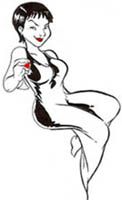Tuesday, October 11, 2005
Salt: flash fiction
Blood gushed unchecked from between her mother’s legs, as the midwife urged her to push, push, push. They lived by the sea, that brought them their food and demanded their toil; and it was in their storm-tossed shanty, attended only by a midwife with no tools but clean cloths and hot water, that her mother died bringing her into the world.Tears did not fall from her father’s eyes—not then, as her mother gasped her last; not later, when she herself wailed lustily at the indignity of being thrust out of the womb; and not after, when both mother and child were each bundled as appropriate, in shroud and blanket respectively. Her father never cried, for his wife was dead and his heart had died with her.
Broth was what the midwife fed her; made from fish and crabs and seaweed, and whatever else she could find that might nourish a months-old child. Milk was hard to come by on the coastline, and dearer than gold. But it was more than sustenance the child craved, for her father put out to sea every morning and came home every night with neither coos nor caresses for his daughter, only the day’s catch flung upon the shanty floor.
Fish they shared when she was old enough to eat it, the midwife long gone to bear children of her own. He caught it and cleaned it. She cooked it and served it. They ate in habitual silence—she, dreaming of an impossible day where they exchanged more than the barest minimum of conversation; he, dreaming of days past, when words had hardly been necessary.
Sweat pooled beneath her breasts as she climbed the highest outcropping overlooking the sea, for here, at least, after her father cast off each morning, she could sing out her sorrows without shame. Shame that she was intruding upon his grief, shame that she dared to think her loss as great as his, her anguish as important.
Breeze caressed her face and brought her words back to her. But although the words were hers, the voice was not—and as she gazed down in astonishment from her lonely outcropping, she saw that the singer was a man, with long, tangled hair like sea wrack, and scales instead of legs. From her dim memories of the midwife’s tales, she knew him to be one of the merkin. He called to her with her own song, holding a hand out in invitation.
Water broke around her as she dove, though she knew that the male merkin were carnivorous, and made no distinction between human flesh and animal. As the sea closed back in over her head, she found she did not care. It felt welcoming to her, salty and warm—like blood, like tears, like love.
This story was originally set in Hinirang, and previously published in the comics anthology ab ovo.Check out the rest of the posse!

Cathy
Gabby
Sascha
Tobie










